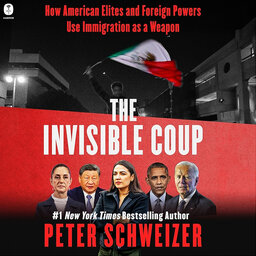Episode 767: Harris/Walz Attacks on Free Speech and Religious Liberty
Newt talks with Andrew Langer, president of Institute for Liberty, about the importance of privacy and free speech. Langer discusses his background and the significance of protecting donor anonymity. The conversation delves into historical and recent examples of government overreach, including actions by Vice President Kamala Harris and Governor Tim Walz, which threaten constitutional liberties. He underscores the dangers of exposing donor lists, citing cases like the NAACP vs. Alabama and recent incidents involving Kamala Harris and Leticia James. The discussion also touches on broader issues of government power, regulatory overreach, and the chilling effects on free speech.
In 1 playlist(s)
Newt's World
Join former House Speaker, professor, historian, and futurist Newt Gingrich as he shares his lifetim…Social links
Follow podcast
Recent clips

Episode 948: ‘Moneyball’ for Politics
30:34

Episode 947: Will AI Take My Job
28:22

Episode 946: Peter Schweizer on “The Invisible Coup”
34:50
 Newt's World
Newt's World